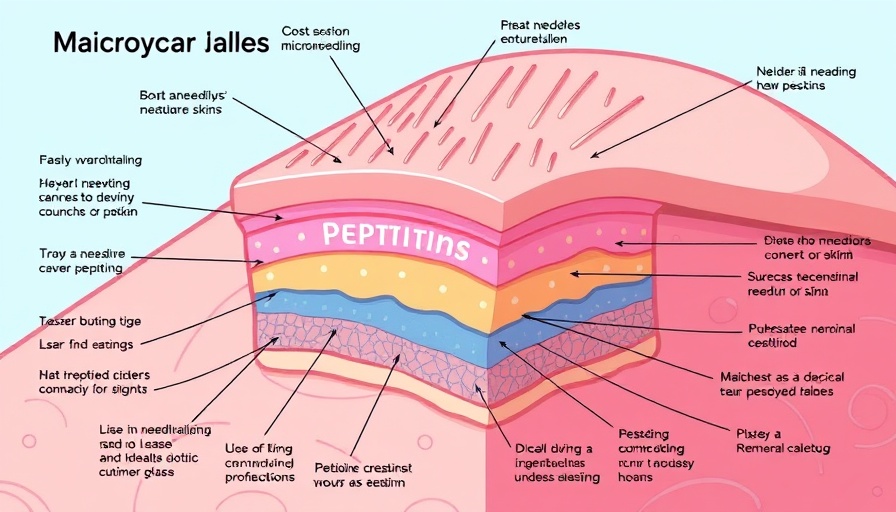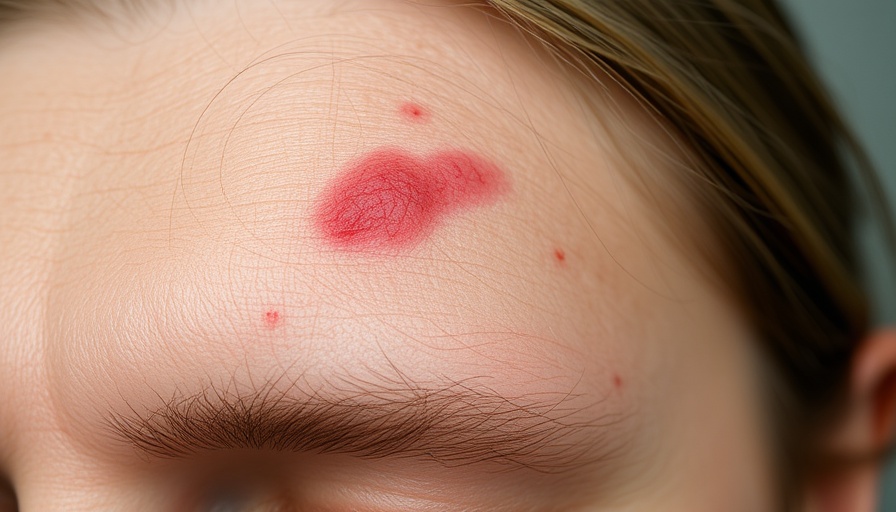
Discover All-Natural Tyrosinase Inhibitors: Your Key to Bright, Even Skin

1 Views
0 Comments

Understanding Tyrosinase Inhibitors: Transform Your Skincare Routine
Update Unlocking the Science: How Tyrosinase Inhibitors Function In the realm of skincare, tyrosinase inhibitors play a pivotal role in preventing hyperpigmentation by targeting the melanin production process. Tyrosinase, an enzyme found in pigment-producing cells, starts the transformation of tyrosine into L-DOPA, a crucial step in melanin synthesis. By inhibiting this enzyme, products containing tyrosinase inhibitors extend beyond merely masking dark spots, essentially blocking the formation of new pigment. This foundational concept of scientific skincare empowers consumers, especially those who seek elegant yet effective solutions for maintaining healthier, more radiant skin. The Dynamic Duo: Combining Tyrosinase Inhibitors with Sunscreen Using tyrosinase inhibitors in conjunction with sunscreen has shown remarkable synergy in skincare routines. As these inhibitors prevent the formation of new pigmentation, the protective barrier of sunscreen serves to shield the skin from harmful UV rays. Together, they not only halt new dark spots from appearing but also facilitate the fading of existing ones, allowing the skin to renew naturally over time. This dual approach is increasingly embraced by those who value non-invasive treatments for skin rejuvenation, ensuring sustained results without the need for more aggressive cosmetic procedures. Real-Life Implications: The Customers' Experience Consumers increasingly seek out brands that embody both efficacy and sophistication in their products. When exploring the experience of users incorporating tyrosinase inhibitors into their daily skincare regimen, many report visible improvements in skin tone and texture. The beauty industry has seen this rise in interest towards scientific and functional ingredients as consumers value transparency and sustainability in their beauty product analysis. Brands that prioritize natural ingredients alongside technological advancements in skincare are becoming frontrunners in this market. Future Trends: The Evolution of Skincare Innovations As we look ahead, the cosmetic dermatology landscape is projected to embrace further innovations in formulations that harness the power of artificial intelligence and biotechnology. The rise of aesthetic medicine trends emphasizes not just immediate results, but also long-term skin health. Integrating advanced laser therapies and cellular rejuvenation techniques with traditional products may soon become the gold standard in pursuing anti-aging solutions. How Every Skincare Routine Can Benefit For the affluent clientele looking for upscale, scientifically backed skincare options, understanding how tyrosinase inhibitors work can unlock new avenues for achieving their beauty goals. With the right educational resources and product knowledge, customers can make informed decisions that blend minimally invasive techniques with effective daily routines. This not only enhances their skin health but fosters a mindful approach to self-care. Ready to explore the world of informed skincare? Discover innovative products that leverage tyrosinase inhibitors and make wise choices towards your beauty routine. Embrace the science behind beauty and prioritize your skin’s health today!

Peptides Unveiled: What They Truly Do for Your Skin's Health
Update Unlocking the Mysteries of Peptides: What They Can Really Do for Your Skin Peptides have taken center stage in the skincare world, emerging as pivotal players in the quest for youthful, vibrant skin. But amidst the glitzy marketing and alluring claims, one must ask: what do peptides really do for the skin? Understanding their scientific foundation can help differentiate evidenced benefits from extravagant promises. The Science Behind Skin Penetration A popular claim is that peptides are small enough to penetrate the skin barrier. While it’s true that peptides are smaller than collagen molecules, many are still too large to easily cross this barrier. In fact, most peptides exceed the 500 Dalton rule for passive skin penetration. Research has shown that only a minute fraction of certain peptides, like Argireline, can effectively reach deeper skin layers when applied topically. However, this doesn’t spell doom for peptide efficacy. Brands utilizing advanced delivery systems can enable these protein fragments to reach their intended targets more efficiently, enhancing their effectiveness significantly. Advancements in Delivery Mechanisms Utilizing well-engineered formulas can make a tremendous difference. Modern cosmetic chemists are developing ingenious methods to facilitate peptide delivery. Techniques such as microencapsulation or the incorporation of fatty acids can enhance a peptide's penetrative abilities. For instance, Matrixyl® features a unique formulation that promotes absorption, demonstrating that marketing claims about engineered delivery can indeed be substantiated—though it’s wise to look for supporting clinical data from brands. Cell-Penetrating Peptides: Hopeful Horizons Emerging research on Cell-Penetrating Peptides (CPPs) such as GHK-Cu is fueling excitement in the skincare realm. These peptides are designed to enhance cellular interactions, potentially guiding anti-inflammatory responses. While current research embodies promise, comprehensive human clinical trials are needed to validate their effectiveness fully. It's vital to stay informed about these developments, especially as they relate to broader anti-aging solutions. Understanding Skin Aging: What Peptides Offer Peptides might hold the key to promoting collagen production, an essential factor in maintaining skin elasticity. Aging skin often experiences reduced collagen synthesis, leading to sagging and wrinkles. By supporting collagen and elastin production, peptides may offer an innovative approach to facial rejuvenation. Additionally, advancements in technology have birthed various non-invasive procedures that compliment peptide treatments, creating a holistic approach to anti-aging routines. Practical Tips for Choosing Peptide Products When selecting peptide-infused products, consider aspects like formulation and scientific backing. High-quality peptides should be supported by results from rigorous beauty research. Look for brands that share clinical studies demonstrating the effectiveness of their products, ensuring that you invest in effective skincare solutions. It’s also worth considering the additional benefits of combining peptide treatments with techniques such as micro-needling or other minimally invasive techniques to amplify results. Conclusion: Embrace the Future of Skincare As the skincare industry evolves, knowledge about peptides can empower you as a consumer. Recognizing the scientific truths separating skincare from marketing hype enables informed decisions regarding your beauty routine. So, as you explore the world of skincare innovations and aesthetic treatments, incorporate the power of peptides into your regimen wisely. Stay tuned to advancements in beauty technology and skincare science that can elevate your skincare game.

Explore Delgocitinib: A Promising Solution for Sensitive Skin Treatment
Update Unlocking New Options for Sensitive Skin: Delgocitinib’s BreakthroughAtopic dermatitis (AD) can be especially tricky when it affects the face and neck. Patients often struggle with treatments that feel too harsh for sensitive skin, risking visible side effects such as skin thinning or irritation. This is where delgocitinib ointment, a topical Janus kinase (JAK) inhibitor, enters the conversation as an exciting alternative. Approved in Japan since 2020, delgocitinib is gaining attention for its potential to improve both treatment satisfaction and skin outcomes in individuals with facial or neck lesions.A One-Size-Fits-All Approach?Traditionally, treatments for sensitive areas have relied on corticosteroids as a first-line option. However, their long-term use is limited due to adverse effects. For addition, while calcineurin inhibitors, like tacrolimus, offer lower risks of skin thinning, they can come with their own set of drawbacks such as local irritation and a slower onset of action. With more people finding themselves searching for solutions to sensitive skin, the emergence of new topical agents like delgocitinib might finally address those unmet needs.Japanese Study Sheds Light on Treatment EfficacyA recent multicenter clinical study in Japan evaluated the transition from traditional therapies to delgocitinib for patients experiencing facial or neck AD. Results from the study indicated significant improvements not only in treatment satisfaction but also in disease severity and adverse effects. The findings make a strong case for this new ointment as a viable, non-invasive treatment option in the cosmetic dermatology toolbox.The Future of Non-Invasive TreatmentsLooking ahead, delgocitinib’s promising results indicate a shift in the landscape of dermatological care, particularly for those affected by chronic skin conditions. As the beauty and aesthetic medicine markets continue to innovate, products that seamlessly integrate efficacy with patient-centered care are likely to dominate. Delgocitinib opens avenues not only for individual treatment satisfaction but also for combination therapies that might leverage multiple approaches to enhance skin health.What This Means for YouIf you're among the many who have battled the visible effects of atopic dermatitis, the advent of treatments like delgocitinib provides hopeful possibilities for achieving healthier skin without compromising on aesthetics. As the cosmetic industry evolves, stay informed and empowered in your choices for skincare.
 Add Row
Add Row  Add
Add 

Write A Comment